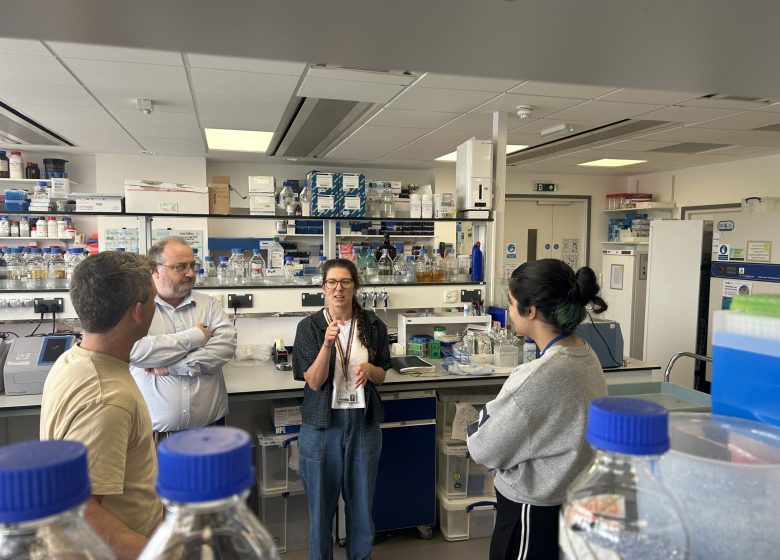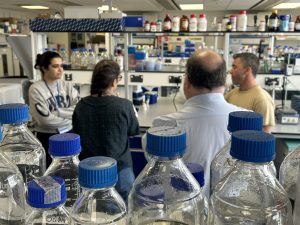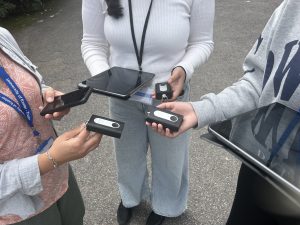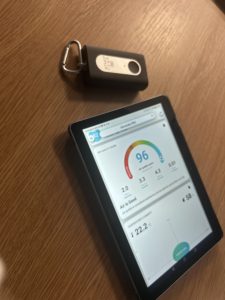Welcoming Future Changemakers to the Net Positive Centre
- Posted on: 21 August 2025

We were delighted to recently host two exceptional A-level students, Diana Mahmoudzadeh and Delara Mahmoudzadeh from Birmingham, for a 2 week placement at the Centre for Net Positive Climate and Health Solutions together with ECEHH European Centre for Environment and Human Health. Their visit was part of an inspiring outreach initiative run by the University of Exeter Medical School, aimed at giving young people first-hand experience in medicine as well as health and climate research.
A huge thank you to Diana and Delara for being such thoughtful and engaged contributors and we are grateful to their contribution to our Net + blog.
When applying for our Nuffield Research Placements, we were drawn to the European Centre for Environment and Human Health (ECEHH) because of one key observation: while there’s a growing body of research on how climate change affects ecosystems, there’s far less attention paid to how it impacts people especially their physical and mental health. This gap was important to us. We believe that understanding how climate change affects human health is essential to developing fair, effective responses. That belief led us to a placement with the UKRI funded Net Positive Centre a resea rch initiative focused on finding sustainable, community led solutions to the health challenges posed by a changing climate.
rch initiative focused on finding sustainable, community led solutions to the health challenges posed by a changing climate.
Over two weeks, we contributed to a literature review on the health impacts of air pollution from respiratory illness to cardiovascular stress and how public health interventions can reduce harm. But our experience went far beyond reading academic papers. It was immersive, interactive, and reflective giving us a deeper understanding of what meaningful, equitable research looks like. Our project began with an introduction to the wide-ranging ways climate change affects health from increased heatwaves and food system disruptions to the spread of diseases and access to green and blue spaces for physical activity. We were encouraged to think critically about public health systems, social inequalities, and the way scientific evidence is translated into real world change. Through group discussions, walking fieldwork using air quality sensors, and workshops on research methods, we saw how research isn’t just about gathering information it’s about asking the right questions, often with the communities most affected. The Centre’s commitment to public engagement and health equity resonated with us deeply. This wasn’t just research for the sake of knowledge it was research with a purpose: to create positive, lasting impact.
Over the first week, we explored how climate health research brings together public health, climate science, social science, and policy. Workshops on literature reviews, logic models, and science communication built our technical skills, while activities like a campus walk with air quality sensors showed how data connects to lived experiences.


In the second week, we worked more independently writing literature reviews, creating academic posters, and translating complex findings into clear messages. Presenting our work to a panel of researchers was challenging but rewarding, giving us greater confidence in public speaking and collaboration.
These two weeks strengthened our skills in critical thinking, scientific writing, and accessible communication, while also teaching us how to approach research with empathy and a focus on community benefit. We now see climate change not just as an environmental crisis, but as a public health emergency that deepens inequalities. Addressing it requires co-produced solutions created with, not just for, the communities most affected.
This placement has given us the knowledge, confidence, and motivation to keep asking important questions and working toward answers that make a real difference. We leave determined to contribute to healthier, more resilient communities in a changing climate.
We’re grateful to the team at the Net Positive Centre and European Centre for creating a space where young researchers like us could learn, contribute, and grow. We leave not only with academic skills, but with a deeper motivation to pursue futures in science, health, and sustainability and to help build a fairer, more resilient world.